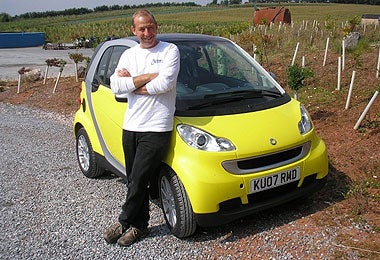Smart Fortwo Coupé Passion
The little car that could The larger models have fallen by the wayside, but Smart's revamped Fortwo still runs rings round the rest of the eco-friendly pack, says David Wilkins

Price: £8,540
Engine: 1-litre petrol
Performance: 0-60mph in 13.3secs, 60.1mpg
CO2: 112g/km
Worth considering: Ford Ka, Mitsubishi i, Toyota Aygo
Our readers test the new Smart Fortwo, the successor to the original model that so shocked, amused and impressed the world with its clever, compact design in 1998. From the outset, DaimlerChrysler was ambitious for Smart, which was conceived as a complete range rather than a single product. When the original car was joined first by the Smart Roadster, and then by the four-door Smart Forfour, it became the Smart Fourtwo in order to distinguish it from the others.
But while each of these cars was well-received, DaimlerChrysler's big plans for Smart didn't quite work out. The additional models were dropped, leaving just the Fortwo as the sole representative of the brand once more.
This new Fortwo, which follows the same basic two-passenger layout, with the engine mounted low down between the rear wheels, represents consolidation rather than another radical step forward. In my book, this caution is entirely forgivable, given that the Fortwo probably remains the most advanced small-car concept in production, at least in Europe.
The new car is a little longer and wider than the old one – partly a response to new pedestrian-safety regulations. A further advantage of the newer model's increased length is that it has a surprisingly useful luggage compartment. At 220 litres, it's about half the size of the average saloon car's boot, so it's easily capable of swallowing a couple of suitcases.
The space provided for the occupants is generous, too, and vindicates Smart's decision to design a two-seater from the ground up, rather than simply producing a shrunken version of a larger car, which is to say, a cramped four-seater. Passengers and drivers alike tend to like the Fortwo's high seating position.
On the road, the Fortwo acquits itself pretty well. It's not the sort of machine you would buy if you were looking for out-and-out cornering prowess, but there is little of the sort of pitching or bobbing you might expect from a car with such a short wheelbase. The Fortwo also has enough power to keep up with motorway traffic, and the delays in shifting that were apparent on some previous Smarts' automated manual gearboxes have been reduced, if not entirely eliminated. Fuel economy is exceptional.
But in an age when automotive taxes and charges increasingly reflect environmental concerns, this car's trump card might turn out to be its low CO2 emissions. With the arrival of the new Fortwo, the day of the Smart may, after a few false dawns, have arrived.
Sean Simpson, 45, observer/navigator from Devon
Usual cars: Land Rover Freelander TD4, Suzuki Swift 1.3, Nissan 300ZX
The Fortwo seemed to be a car full of contradictions. Although quite a light and amazingly small vehicle, it seemed slightly sluggish off the mark, considering the engine size, with firm positive steering providing a strain on the arms at speed, and fairly hard suspension which emphasised road blemishes. Once inside the space was quite a pleasant surprise. The automatic gearbox took some getting used to, as it had a tendency to roll forward and backward while in gear with a noticeable lag when shifting. However, it was an enjoyable, unique drive that improved with time.
Jonathon Kelly, 33, care home supervisor from Taunton
Usual Car: Toyota Celica GT
This is the car that the Mercedes executives hope will push the brand on to bigger sales and success. Fortunately for them, the Fortwo is an incredibly capable car. Being over six foot tall, I was surprised by how spacious the interior was. The design is aesthetically pleasing and practical, and this model was well-equipped. The drive was smooth and responsive, with the variable automatic gearbox working well. Despite its tiny engine, it has a lot of poke – I was able to overtake with confidence and it cruised along at the legal top end comfortably. Far more than just a city car, yet still a leader in environmentally conscious motoring, the Fortwo is a real winner.
Chloë Palfreman, 25, education consultant from north-west London
Usual mode of transport: bicycle
On first impression, the Smart is like the anti-car. From concept to design to fuel consumption, it seems to solve the moral dilemma of driving in the big city. Hand on the door with only a metre of car beyond, or sliding with ease into a tight parking spot, this feels like the only way to drive. How could anyone accelerate towards a pedestrian, shake a fist at another driver, or worry about a carbon footprint in this pleasing little thing? And all without forgoing any "driving experience". Then, on reflection, I wonder if much of the Smart Car idea is tokenistic. It is still a car, albeit pint-sized. It may be a tiny step in the right direction, but it is still not a bicycle.
The Verdict
If you would like to take part, email motoring@indepen dent.co.uk or write to: The Verdict, Features Department, Independent House, 191 Marsh Wall, London E14 9RS, giving your address, phone number and details of the car, if any, you drive. For most cars, participants must be over 26 and have a clean licence.
Subscribe to Independent Premium to bookmark this article
Want to bookmark your favourite articles and stories to read or reference later? Start your Independent Premium subscription today.

Join our commenting forum
Join thought-provoking conversations, follow other Independent readers and see their replies